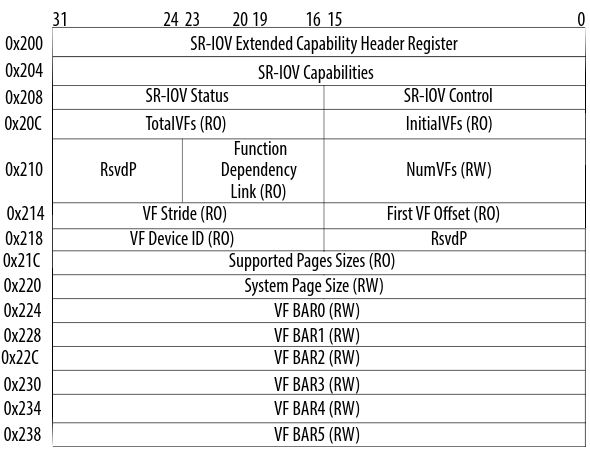single root input/output virtualization (SR-IOV) is PCIe specifications that provide virtual function (in this context, the usual PCIe function would be physical function). virtual function is used VM for better performance. It allows flow the data like physical function with limited capabilities.
Finding SRIOV capabilities space Link to heading
897 int pci_iov_init(struct pci_dev *dev)
898 {
899 int pos;
900
901 if (!pci_is_pcie(dev))
902 return -ENODEV;
903
904 pos = pci_find_ext_capability(dev, PCI_EXT_CAP_ID_SRIOV);
905 if (pos)
906 return sriov_init(dev, pos);
907
908 return -ENODEV;
909 }
pos is found by pci_find_ext_capability which calls pci_find_next_ext_capability to get the extended configuration capabilities with SRIOV ID. Note the comare at line 566.
540 u16 pci_find_next_ext_capability(struct pci_dev *dev, u16 start, int cap)
541 {
...
...
565 while (ttl-- > 0) {
566 if (PCI_EXT_CAP_ID(header) == cap && pos != start)
567 return pos;
568
569 pos = PCI_EXT_CAP_NEXT(header);
570 if (pos < PCI_CFG_SPACE_SIZE)
571 break;
572
573 if (pci_read_config_dword(dev, pos, &header) != PCIBIOS_SUCCESSFUL)
574 break;
575 }
576
Once we have the position, The next phase is reading SRIOV configuration space in sriov_init
iov initialization Link to heading
The configuration space for SRIOV as follows

insriov_init, The first things is getting some parameter above.
768
769 pci_read_config_word(dev, pos + PCI_SRIOV_TOTAL_VF, &total);
770 if (!total)
771 return 0;
772
773 pci_read_config_dword(dev, pos + PCI_SRIOV_SUP_PGSIZE, &pgsz);
774 i = PAGE_SHIFT > 12 ? PAGE_SHIFT - 12 : 0;
775 pgsz &= ~((1 << i) - 1);
776 if (!pgsz)
777 return -EIO;
778
779 pgsz &= ~(pgsz - 1);
780 pci_write_config_dword(dev, pos + PCI_SRIOV_SYS_PGSIZE, pgsz);
Next step is parsing the virtual function BAR(base address register) and store info in iov
786 nres = 0;
787 for (i = 0; i < PCI_SRIOV_NUM_BARS; i++) {
788 res = &dev->resource[i + PCI_IOV_RESOURCES];
789 /*
790 * If it is already FIXED, don't change it, something
791 * (perhaps EA or header fixups) wants it this way.
792 */
793 if (res->flags & IORESOURCE_PCI_FIXED)
794 bar64 = (res->flags & IORESOURCE_MEM_64) ? 1 : 0;
795 else
796 bar64 = __pci_read_base(dev, pci_bar_unknown, res,
797 pos + PCI_SRIOV_BAR + i * 4);
798 if (!res->flags)
799 continue;
800 if (resource_size(res) & (PAGE_SIZE - 1)) {
801 rc = -EIO;
802 goto failed;
803 }
804 iov->barsz[i] = resource_size(res);
805 res->end = res->start + resource_size(res) * total - 1;
806 pci_info(dev, "VF(n) BAR%d space: %pR (contains BAR%d for %d VFs)\n",
807 i, res, i, total);
808 i += bar64;
809 nres++;
810 }
once we have all the info in iov, iov is set to dev->sriov
812 iov->pos = pos;
813 iov->nres = nres;
814 iov->ctrl = ctrl;
815 iov->total_VFs = total;
816 iov->driver_max_VFs = total;
817 pci_read_config_word(dev, pos + PCI_SRIOV_VF_DID, &iov->vf_device);
818 iov->pgsz = pgsz;
819 iov->self = dev;
820 iov->drivers_autoprobe = true;
821 pci_read_config_dword(dev, pos + PCI_SRIOV_CAP, &iov->cap);
822 pci_read_config_byte(dev, pos + PCI_SRIOV_FUNC_LINK, &iov->link);
823 if (pci_pcie_type(dev) == PCI_EXP_TYPE_RC_END)
824 iov->link = PCI_DEVFN(PCI_SLOT(dev->devfn), iov->link);
825
826 if (pdev)
827 iov->dev = pci_dev_get(pdev);
828 else
829 iov->dev = dev;
830
831 dev->sriov = iov;
832 dev->is_physfn = 1;
833 rc = compute_max_vf_buses(dev);
834 if (rc)
835 goto fail_max_buses;
836